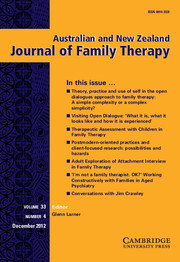Crossref Citations
This article has been cited by the following publications. This list is generated based on data provided by
Crossref.
Flaskas, Carmel
2010.
Frameworks for Practice in the Systemic Field: Part 1 — Continuities and Transitions in Family Therapy Knowledge.
Australian and New Zealand Journal of Family Therapy,
Vol. 31,
Issue. 3,
p.
232.
Holeman, Virginia T.
Dean, Janet B.
Deshea, Lise
and
Duba, Jill D.
2011.
The Multidimensional Nature of the Quest Construct Forgiveness, Spiritual Perception,& Differentiation of Self.
Journal of Psychology and Theology,
Vol. 39,
Issue. 1,
p.
31.
MacKay, Linda
2012.
Trauma and Bowen Family Systems Theory: Working with Adults Who were Abused as Children.
Australian and New Zealand Journal of Family Therapy,
Vol. 33,
Issue. 3,
p.
232.
Turns, Brie Ann
Morris, Sarah J.
and
Lentz, Nicole Ann
2013.
The Self of the Christian Therapist Doing Sex Therapy: A Model for Training Christian Sex Therapists.
Sexual and Relationship Therapy,
Vol. 28,
Issue. 3,
p.
186.
MacKay, Linda
and
Brown, Jenny
2013.
Collaborative Approaches to Family Systems Supervision: Differentiation of Self.
Australian and New Zealand Journal of Family Therapy,
Vol. 34,
Issue. 4,
p.
325.
Kriščiūnaitė - Ragelienė, Tija
2014.
Interconnection Between Adolescents Identity Formation, Relationships with Parents, Differentiation of Self and Satisfaction with Life.
Ugdymo psichologija,
Vol. 25,
Issue. ,
p.
32.
Ångström-Brännström, Charlotte
Dahlqvist, Vera
Strandberg, Gunilla
and
Norberg, Astrid
2014.
Descriptions of Comfort in the Social Networks Surrounding a Dying Child.
Nordic Journal of Nursing Research,
Vol. 34,
Issue. 3,
p.
4.
Sokmen, Yesim Canan
and
Watters, Alan
2016.
Emotion Regulation with Mindful Arts Activities Using a Personalized Self-Soothing Kit.
Occupational Therapy in Mental Health,
Vol. 32,
Issue. 4,
p.
345.
MacKay, Linda M.
2016.
Commentary I.
Australian and New Zealand Journal of Family Therapy,
Vol. 37,
Issue. 3,
p.
362.
MacKay, Linda M.
2017.
Differentiation of Self: Enhancing Therapist Resilience When Working with Relational Trauma.
Australian and New Zealand Journal of Family Therapy,
Vol. 38,
Issue. 4,
p.
637.
Beck, Thomas
Riedl, David
Schöckel, Anne
Reddemann, Luise
Exenberger, Silvia
and
Lampe, Astrid
2017.
Measuring Self-Soothing Ability in Patients with Childhood Trauma – Psychometric Evaluation of the Self-Soothing Scale in a Clinical Sample.
Zeitschrift für Psychosomatische Medizin und Psychotherapie,
Vol. 63,
Issue. 4,
p.
405.
Holyoak, Derek
and
Hertlein, Katherine
2018.
The Self of the Mormon Sex Therapist: Strategies for Sex Therapists-in-Training.
The American Journal of Family Therapy,
Vol. 46,
Issue. 3,
p.
258.
YILDIRIM, Buğra
2020.
SOSYAL HİZMET UYGULAMASINDA BOWEN'IN AİLE SİSTEMLERİ YAKLAŞIMI.
Sosyal Politika Çalışmaları Dergisi,
Vol. 20,
Issue. 47,
p.
287.
Frewen, Paul
Mistry, Divya
Zhu, Jenney
Kielt, Talia
Wekerle, Christine
Lanius, Ruth A.
and
Jetly, Rakesh
2020.
Proof of Concept of an Eclectic, Integrative Therapeutic Approach to Mental Health and Well-Being Through Virtual Reality Technology.
Frontiers in Psychology,
Vol. 11,
Issue. ,
Homme, Gro Anita
and
Shults, F. LeRon
2020.
The Shaping of the Self: Patterns and Pathways in Bowlby, Kohut, and Bowen.
Australian and New Zealand Journal of Family Therapy,
Vol. 41,
Issue. 4,
p.
367.
Iovino, Emily A.
Koslouski, Jessica B.
and
Chafouleas, Sandra M.
2021.
Teaching Simple Strategies to Foster Emotional Well-Being.
Frontiers in Psychology,
Vol. 12,
Issue. ,
Kaleta, Kinga
and
Mróz, Justyna
2023.
How forgiveness relieves anxiety: the role of differentiation of self.
Journal of Beliefs & Values,
Vol. 44,
Issue. 3,
p.
363.
ALSANCAK-AKBULUT, Cansu
ELİBOL-PEKASLAN, Nur
BAYRAM GÜLAÇTI, Huri Gül
and
ŞAHİN-ACAR, Başak
2023.
Examination of emotion regulation in the family context: A mixed method study from Turkey.
Klinik Psikoloji Dergisi,
Vol. 7,
Issue. 1,
p.
90.
Petrofes, Cara
Howard, Krista
Mayberry, Azucena
Bitney, Catherine
and
Ceballos, Natalie
2024.
Sad-fishing: Understanding a maladaptive social media behavior in college students.
Journal of American College Health,
Vol. 72,
Issue. 8,
p.
2352.
Wright, Jo
Milligan, Robyn
and
Varcoe, Michelle
2024.
Reducing risk: navigating emotional triangles in clinical work with youth suicidality and self‐harm.
Australian and New Zealand Journal of Family Therapy,
Vol. 45,
Issue. 2,
p.
209.


